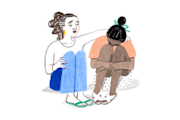What's it like when you're dating or romantically involved with a partner with avoidant personality disorder (AVPD) or an avoidant attachment style?
Wondering how to love someone with avoidant personality disorder?
Or, what if you suspect you may have AVPD or avoidant attachment style?
Does being an avoidant mean you lack empathy or you're doomed to experience issues in all your romantic relationships?
Thankfully, no.
Read on to find out more about avoidant personality disorder and relationships.
Plus, take our 3-Minute Attachment Style Test to find out your attachment style.
If you’re having a challenging time with relationship issues, consider talking with a therapist or counselor near you.

Do avoidants fall in love?
People with avoidant personality disorder (AVPD) or avoidant attachment style may come across as cold or withholding, when—in fact—they’re trying to protect themselves.
Many people with AVPD describe going long stretches of time without contact with even close family members and loved ones.
According to a March 2018 article on current insights on AVPD published in the journal Psychology Research and Behavior Management, it's estimated that between 1.5 and 2.5% of the population has AVPD.
That means approximately 6 million Americans are living with avoidant personality disorder.

What's avoidant personality disorder (AVPD)?
The Diagnostic and Statistical Manual of Mental Disorders, fifth edition (DSM-5), says individuals with avoidant personality disorder (AVPD) experience strong feelings of inadequacy and an overwhelming fear of rejection and criticism.
Avoidants' fear of rejection can create insecurity and anxiety so profound that many with AVPD avoid social situations altogether.
AVPD is considered a highly pervasive disorder, meaning its effects are chronic and spill over into all areas of life.
According to Dr. Lisa Lampe, PhD and Professor Gin Singh Malhi, MD, Psychiatry Chair at The University of Sydney, AVPD has received relatively little research attention—particularly when compared to social anxiety disorder, a somewhat similar condition.
As Lampe and Malhi point out in their review, individuals with avoidant personality disorder may also experience substance abuse and increased odds of suicidal ideation.
Finally, AVPD may also be a significant predictor of chronic depression.

How do avoidants behave?
No matter how well-liked a person may be in reality, it can be hard for an avoidant to believe anything positive about themselves when their own mind is bent on convincing them otherwise.
Though many with AVPD learn to mask their symptoms, the internal turmoil wrought by constantly feeling judged and disliked takes a toll.
Often, avoidants will perceive criticism and negative feedback where there is none at all, and find it difficult or impossible to recover from the perceived blows to their self-worth.
For those living with avoidant personality disorder, one of the clearest areas to notice this spillover is in relationships.
Avoidant personality disorder in relationships
Even for the most confident among us, intimacy can at times feel uneasy.
Whether in romantic, familial, or platonic relationships, they don’t call it "the mortifying ordeal of being known" for nothing!
Avoidants, however, find interpersonal relationships more than simply uneasy—they can be practically unbearable.
A recent study in the Journal of Clinical Psychology interviewed people with AVPD. The overwhelming takeaway was the degree to which avoidants "long to connect with others, yet feared to get close.”

What is an avoidant thinking?
“I constantly think I’m a burden,” said Ebru, a 25-year-old diagnosed with AVPD. “And therefore want to avoid people in order to avoid feeling like a burden—I can’t have relationships because the thought of someone being close to me and being able to hurt or ridicule me terrifies me.”
In a video posted on YouTube, a man diagnosed with AVPD named Mario confirms this. He is engaged to be married, but lives apart from his fiancée, in part because he’s afraid of that closeness. “I love her, but at the same time I’m scared... out of my mind.”
EL, a woman with AVPD, acknowledges that she isolates herself from others. “I avoid family, and people I’ve known my whole life,” she says in a YouTube video. “I don’t have friends or anything.”
“I couldn’t hold eye contact with people, I couldn’t smile at people,” she adds, describing behavior others might interpret as unfriendly, which, for her, was simply a symptom of her avoidant personality disorder. “I was just totally in my head, just hating myself.”
In fact, EL says she feels guilty when she interacts with another person—and even often ashamed for “taking up someone else’s time, and making them have a worse day just because I interacted with them.”
How can I be less avoidant at work?
Avoidants often find ways to avoid work situations involving social interaction—even without necessarily realizing they’re doing so.
Imagine someone always gets sick with stress before the big monthly meeting at which they’re expected to present and ends up skipping the whole thing.
This could be both a physical manifestation of anxiety and a continuation of the symptoms of AVPD.
Research suggests that AVPD can affect employment at similar rates to depression, which has been shown to reduce a person’s chances of being employed.
Even if avoidants aren't reprimanded or fired over this behavior, they’re likely to miss out on opportunities for connection and make themselves less visible for both promotions and positive coworker relationships.
In a work culture built around networking and mutual trust, this behavior is severely detrimental to long term career prospects.
“Feeling worthless is a constant factor across all relationships,” said Ebru. “With professional ones, I always think the other person knows better than me, and I avoid conflicts at all costs.”

How AVPD affects your relationship with yourself
Avoidants tend to make assumptions about other people’s thoughts. That is, they assume others think of them the way they think of themselves—which is negatively.
“After interacting with people,” says EL. “I just get really overwhelmed with whether I made them feel really uncomfortable.”
And while everyone behaves awkwardly at some point or another, avoidants are likely to see an experience like this as evidence confirming their worst suspicions of themselves.
The hyper-critical views that people with AVPD have of themselves expand beyond their behavior in social situations.
Often, they will find fault with their physical appearances and with their thinking or emotional processes—even when alone.
Avoidants often deal with other mental health symptoms as well, and are more likely than those without the disorder to develop depression or major depressive disorder (MDD), substance use disorders, and disordered eating habits.
Historically, AVPD has been heavily associated with social anxiety disorder. The two share many symptoms, including high levels of social anxiety and avoidance.
They have been linked to varying degrees across different versions of the DSM (Diagnostic and Statistical Manual of Mental Disorders), which is a sort of encyclopedia of mental illnesses and disorders used by psychiatrists and other mental health professionals.
The most recent edition identifies AVPD and social anxiety disorder as two distinct disorders.

How avoidants can improve relationships
Having an understanding of how AVPD can affect relationships is useful, because it helps arm you with the knowledge that others share your experiences—and that just because you feel uncared for, doesn’t mean you are.
Ultimately, avoidants are as capable of experiencing healthy and fulfilling romantic relationships as anyone else.
This is especially true when they know the challenges they face, and have tools in place for handling them.
As EL describes, sometimes it can be all about taking, “little steps, little breaths.”
In their study into AVPD, Dr. Sørensen and her team found that therapy “provides an opportunity for persons diagnosed with AVPD to experience being met with acceptance and understanding.”
Another study, conducted by Dr. Lisa Lampe and Dr. Gin S Malhi, also suggests therapy can be helpful for those living with AVPD.
AVPD can be so isolating, because those living with its symptoms find themselves convinced that people dislike them, and they and may never feel safe enough to ask whether this is actually true.
Getting help with relationship attachment issues
Seeking support from a mental health professional can help people with AVPD learn coping mechanisms and develop or strengthen relationships.
In a therapeutic relationship, an avoidant can “practice” a social relationship with their therapists and ask candidly about how they are being perceived.
If you’re having a challenging time with relationship issues, consider talking with a therapist who specializes in avoidant personality disorder and/or therapists with expertise in attachment-based issues.

Find out your attachment style
Take our 3-Minute Attachment Style Quiz to find out your personal attachment style. Get a free customized report.
Knowing your attachment style is helpful to developing a better understanding of your interactions and behavior in relationships.
READ NEXT: What Are the 4 Attachment Styles?
Need to find a therapist near you? Check out the Monarch Directory by SimplePractice to find licensed therapists with availability and online booking.









